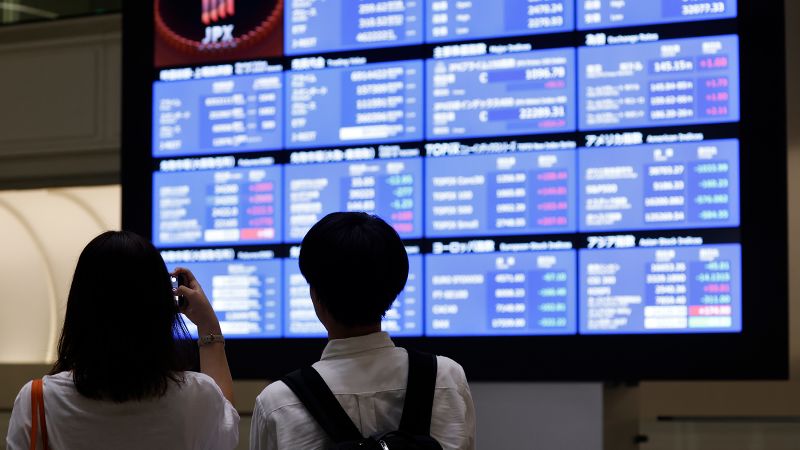Summarize this content to 2000 words in 6 paragraphs
A comeback rally in Japanese stocks has quickly lost steam, as the specter of a US economic slowdown and further yen volatility cast a long shadow across global financial markets.
The Nikkei 225 ended down 0.7% on Thursday, snapping a two-day winning streak. Meanwhile, the yen strengthened 0.6% to 146 against the US dollar, after losing nearly 2% on Tuesday and Wednesday combined.
The benchmark Japanese index had soared in the past two sessions after a dramatic rout on Monday, as investors took some solace from the words of central bank officials.
But Thursday’s chill spread to Europe, with the region’s benchmark Stoxx Europe 600 Index trading down 1% by 3.43 a.m. ET. Germany’s DAX and France’s CAC 40 were down 0.8% and 1% respectively, while London’s FTSE 100 was 1.1% lower.
US futures were also signaling a weak start for stocks on Wall Street. S&P 500 futures were down 0.5% and Nasdaq futures 0.4% lower.
On Wednesday, Bank of Japan (BOJ) deputy governor Shinichi Uchida said policymakers would not raise interest rates “when financial markets are unstable.” He sought to calm nerves after expectations that Japan would continue to tighten monetary policy sent markets into a tailspin on Monday.
The surge in the yen, which started when the BOJ signaled a hawkish tilt in monetary policy in recent weeks, forced many hedge funds and other investors to unwind so-called carry trades, a popular investment strategy that involved borrowing money very cheaply in Japan to invest in other markets. That reversal exacerbated the declines across global equity markets.
Uchida said Wednesday he believed the US economy would achieve a soft landing even as concerns had risen that the Federal Reserve had fallen behind in cutting rates.
But those fears, as well as a further jump in the value of the yen, are still haunting the market.
“The potential for a broader US economic slowdown, misaligned global monetary policies and the bubbling geopolitical tensions in the Middle East cast long, ominous shadows across financial markets,” said Stephen Innes, managing partner of SPI Asset Management.
The volatility in the yen, which was at the heart of recent market turmoil, remains elevated, he added.
On Monday, the Nikkei plummeted by the most since 1987, sparking a broader global market sell-off.
Although the BOJ deputy governor has played down a near-term policy hike, his words were “not meant to reverse the course of monetary policy,” said Alex Kuptsikevich, senior market analyst at FxPro.
In Japan, inflation has been close to the 2% target set by the BOJ for almost two years, allowing the central bank to end a period of zero interest rates. Meanwhile, the Federal Reserve is grappling with slowing price growth and a cooling labor market, and it is widely expected to slash rates at its meeting in September.
The narrowing of the interest rate differentials, which had enabled the yen carry trade, could push the yen higher, Kuptiskevich added.
If the US enters a recession and aggressive easing is pursued by the Fed, ”we would not be surprised to see (the dollar) fall to 120 (yen) or lower,” Masamichi Adachi, chief Japan economist at UBS, wrote on Wednesday.
Going ahead, the global trading environment remains unpredictable as many uncertainties hide in the shadows, Innes said.
“The US political election looms, potentially turning the markets into more of a chaotic mosh pit than a graceful waltz,” he added.
Analysts from UBS Chief Investment Office wrote on Thursday that, with just three months to go before Election Day, the race is too close to call.
“We suggest investors avoid making outsized portfolio moves for specific election outcomes at this stage,” they wrote.
In other Asian markets, South Korea’s Kospi closed 0.5% lower, also breaking a two-day stretch of gains. Taiwan’s Taiex finished down 2%. Hong Kong’s Hang Seng last traded flat.













